Top 6 AI Apps in Healthcare in 2025
Published: 27 Jun 2025
The healthcare industry is rapidly evolving and Artificial Intelligence (AI) is at the forefront of this change. AI is revolutionizing the way healthcare providers diagnose, treat and manage patients. From improving patient outcomes to streamlining administrative tasks, AI is making healthcare smarter, faster and more efficient.
But with so many AI tools available, it can be overwhelming to know which ones are the best. For me those which provide mobile app facilities are the best because these allow you access healthcare from the comfort of your home. That’s where knowing the top 6 AI apps in healthcare becomes crucial. These apps not only improve the quality of care but also help in reducing costs, enhancing patient experience and even predicting health trends before they happen.
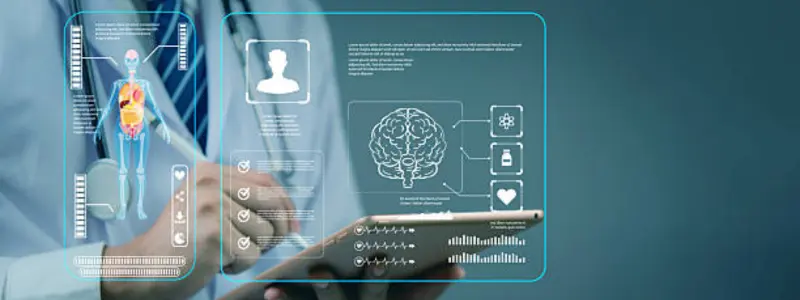
Here is the list of Top 6 AI Apps in Healthcare:
- Noom
- Buoy
- Hucu.ai
- Sensely
- SkinVision
- Ada AI Doctor
Let’s discuss each in great detail.
App 1: Noom
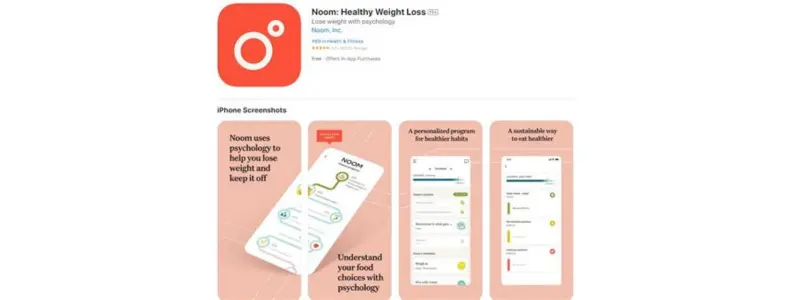
Noom is a digital health platform that combines psychology-based behavior change with AI technology to support sustainable weight loss and overall wellness. In 2025, Noom has introduced several advanced features:
- AI-Powered Food Logging: Users can log meals using photos, text or voice with AI automatically identifying ingredients and quantities. This streamlines the tracking process and improves accuracy.
- Welli – AI Health Assistant: Welli is an AI chatbot that provides 24/7 support, offering personalized advice, motivation and answers to health related questions. It complements human coaching by delivering immediate assistance.
- AI Body Scan & Body Age: A 10-second smartphone camera scan generates a personalized health report, including a 3D model and “Future Me” projection. It also calculates “Noom Body Age,” comparing metabolic health to others .
- GLP-1 Companion Program: For eligible users, Noom offers access to GLP-1 medications like Ozempic® and Wegovy®, delivered to your door within 7 days. The program includes medication tracking, side effect support and AI-driven dynamic calorie goals.
Benefits to Healthcare
Noom’s integration of AI and behavioral science offers several advantages:
- Sustainable Weight Loss: By focusing on the psychological aspects of eating, Noom helps users develop long-term healthy habits and leads to lasting weight loss.
- Personalized Health Insights: The AI Body Scan provides detailed metrics like body fat percentage and lean mass, enabling users to make informed decisions about their health.
- 24/7 Support: Welli offers continuous assistance, ensuring users have access to guidance and motivation whenever needed.
- Medication Integration: The GLP-1 Companion Program combines medication with behavioral coaching, enhancing the effectiveness of weight loss efforts.
Real-World Applications
Noom has been successfully implemented in various settings:
- Corporate Wellness Programs: Employers have integrated Noom to promote employee health, reduce healthcare costs and improve productivity.
- Chronic Disease Management: Healthcare providers use Noom to support patients with conditions like obesity, diabetes and hypertension, aiding in weight management and lifestyle changes.
- Individual Success Stories: Many users have reported significant weight loss and improved health metrics through Noom’s programs, demonstrating its effectiveness in real-world applications.
App 2: Buoy Health
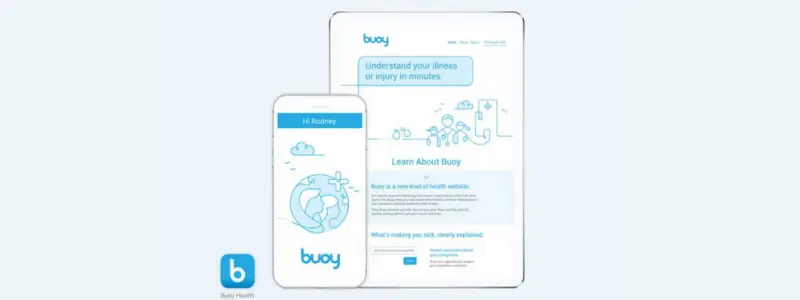
Buoy Health is an AI-powered symptom checker designed to help individuals understand their health concerns and navigate the healthcare system effectively. By engaging in an interactive chat, the AI-driven system asks personalized questions to narrow down possible causes and suggests appropriate next steps for care.
Real-Time Symptom Assessment: Buoy’s AI listens to your symptoms and asks follow-up questions much like a doctor would and provides personalized guidance.
Clinically Vetted Content: The platform offers articles and resources written and reviewed by medical experts, ensuring that users have access to accurate and reliable health information.
Personalized Health Guidance: By asking a series of tailored questions, Buoy provides individualized advice based on users’ specific situations and helps them make informed decisions about their health.
User-Friendly Interface: Buoy’s design makes it easy for users to input their symptoms and receive guidance, enhancing the overall user experience.
Benefits to Healthcare
Buoy Health offers several advantages:
- Accurate Symptom Analysis: The AI-driven system analyzes thousands of real-world data points to provide a thorough assessment of symptoms.
- Guided Care Navigation: Buoy helps users identify potential causes for their symptoms and guides them to the appropriate care. It reduces unnecessary doctor visits and ensure timely medical attention.
- Clinically Reviewed Information: The platform provides access to clinician-reviewed articles and resources, ensuring that users have accurate and reliable health information.
- Improved Access to Care: By offering a digital symptom checker, Buoy increases access to healthcare information, particularly for individuals in remote or underserved areas.
Real-World Applications
Buoy Health has been successfully implemented in various settings:
- Corporate Wellness Programs: Employers have integrated Buoy to promote employee health, reduce healthcare costs and improve productivity.
- Healthcare Providers: Hospitals and insurance companies are increasingly investing in digital health innovations like Buoy to solve problems related to accessing the healthcare system and helping patients get to the right care setting on the first attempt.
- Individual Users: Many individuals have used Buoy to assess their symptoms and receive guidance on appropriate next steps, leading to better health outcomes and more efficient use of healthcare resources.
App 3: Hucu.ai
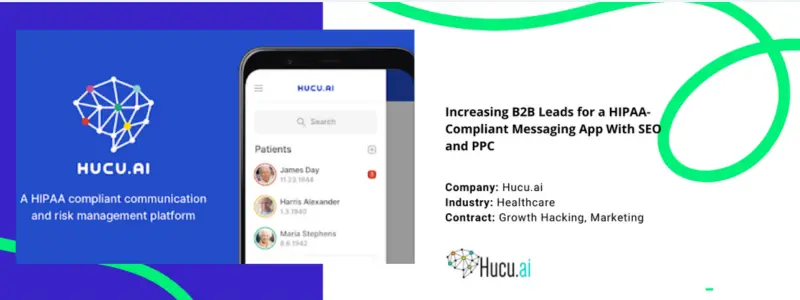
Hucu.ai is a HIPAA-compliant, patient-centered communication platform designed to enhance collaboration among healthcare providers, patients and their families. In 2025, Hucu.ai continues to offer several advanced features:
- Real-Time Acuity Scoring: Prioritize critical patients with a real-time scoring system. This feature enables healthcare teams to quickly identify and respond to high-risk patients, improving patient outcomes.
- EHR Integration: Seamless integration with Electronic Health Records (EHR) and PointClickCare for improved workflows. This integration ensures that patient information is readily available.
- Analytics and Reporting: In-depth analytics for healthcare teams to optimize operations. Hucu.ai provides reports by patient, staff, organization, location and partner. It facilitates the usage, caseload and acuity tracking for better decision-making.
- Family Involvement: Secure channels for family members to stay updated on patient care. This feature enhances communication between healthcare providers and families which make sure that everyone is informed and involved in the patient’s care.
- Multiple Communication Modes: Supports text, voice, video and document/image sharing, facilitating comprehensive interactions within the care team and with patients’ families. This versatility allows for effective communication in various situations.
Benefits to Healthcare
Hucu.ai offers several advantages:
- HIPAA-Compliant Messaging: Secure communication that ensures patient data privacy. By adhering to HIPAA standards, Hucu.ai protects sensitive patient information which fosters trust among users.
- Patient-Centered Communication: Separate channels for care teams and families enhance transparency while safeguarding sensitive information. This approach ensures that all parties involved in patient care have the information they need.
- Real-Time Alerts: Prioritize high-risk patients effectively with real-time acuity scoring. This feature allows healthcare teams to respond promptly to critical situations, improving patient safety.
- Healthcare System Integration: Easily integrates with platforms like PointClickCare for streamlined workflows. This integration reduces administrative burdens and enhances efficiency.
- Detailed Analytics: Comprehensive analytics to optimize team efficiency and care delivery. Hucu.ai’s reporting capabilities assist in identifying areas for improvement and implementing effective strategies.
Real-World Applications
Hucu.ai has been successfully implemented in various settings:
- Home Health and Hospice Agencies: Partnered with WorldView to provide tools that streamline and accelerate communication among all providers, regardless of how many organizations are involved. This collaboration ensures all healthcare teams are instantly in the know with real-time, HIPAA-compliant, patient-centered messaging.
- Direct Primary Care Practices: Integrated with New Benefits to offer physicians and patients easy communication through secure messaging channels. This partnership enhances physician-patient interactions and improves care coordination.
- Healthcare Providers and Associated Healthcare Professionals: Utilized to improve communication, integration, increased productivity, security and tighter alignment among care teams. Hucu.ai’s features support more patients and improve organizational performance by unifying all members of the care team to communicate faster and better.
App 4: Sensely
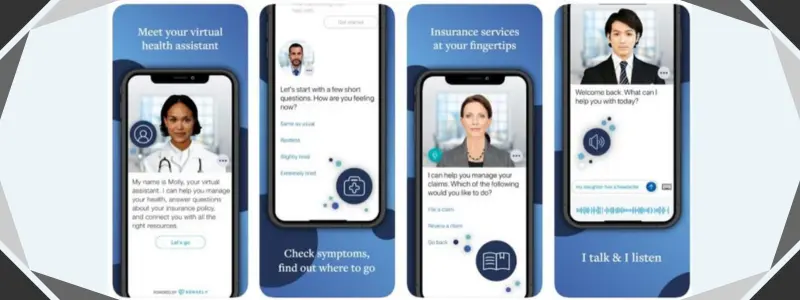
Sensely is an AI-powered virtual nurse assistant designed to enhance patient engagement and streamline healthcare delivery. In 2025, Sensely continues to offer a range of advanced features:
- Symptom Checking & Triage: Sensely’s AI-driven platform allows patients to assess their symptoms and receive guidance on appropriate care pathways. This feature helps in early detection and management of health issues.
- Chronic Condition Management: The platform supports patients in managing chronic conditions such as diabetes, asthma and heart failure by providing personalized care plans and monitoring tools.
- Medication Reminders: Sensely offers medication management features including reminders to help patients adhere to their prescribed treatment plans.
- Appointment Scheduling: Patients can schedule, reschedule and confirm appointments easily through the app, reducing administrative workload and ensuring convenient access to care.
- Multilingual Support: The platform provides support in multiple languages, making healthcare more accessible to diverse populations.
- Integration with Healthcare Systems: Sensely integrates with existing healthcare systems, facilitating seamless communication between patients and providers.
Benefits to Healthcare
Sensely offers several advantages to the healthcare sector:
- Enhanced Patient Engagement: By providing personalized, interactive support, Sensely encourages patients to take an active role in their healthcare, leading to improved outcomes.
- Reduced Healthcare Costs: By streamlining administrative tasks and reducing the need for in-person visits, Sensely helps lower healthcare costs for providers and patients alike.
- Improved Access to Care: Sensely’s 24/7 availability ensures that patients can receive guidance and support at any time. This improves access to care, especially in underserved areas.
- Data-Driven Insights: The platform collects and analyzes patient data to provide actionable insights, aiding in better decision-making and personalized care.
Real-World Applications
Sensely has been successfully implemented in various healthcare settings:
- NHS Integration: Sensely’s Ask NHS app has been integrated into the UK’s National Health Service, enabling patients to access physiotherapy and mental health care services during the COVID-19 crisis.
- UCSF Health Partnership: UCSF Health utilizes Sensely to triage patients, allowing emergency room staff to focus on more critical cases and improving overall efficiency.
- Insurance Providers: Insurance companies have adopted Sensely to assist members with insurance services and healthcare resources, enhancing member experience and satisfaction.
App 5: SkinVision
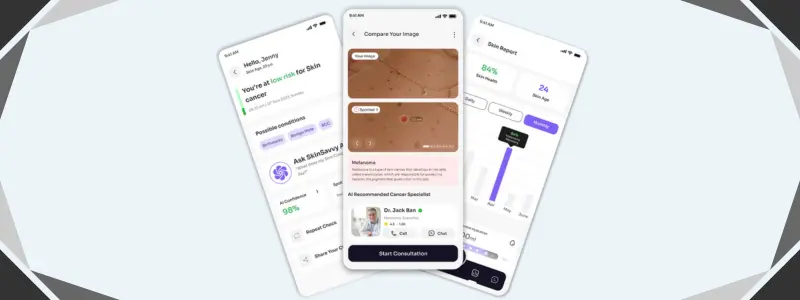
SkinVision, One of the famous dermatology AI tools, is an AI-powered mobile application designed to assist in the early detection of skin cancer. By leveraging advanced machine learning algorithms, the app analyzes photos of skin lesions to assess the risk of skin cancer, including melanoma, basal cell carcinoma and squamous cell carcinoma. Key features include:
- AI-Powered Risk Assessment: Users can take a photo of a skin spot and the app provides an immediate risk indication within 30 seconds. The AI algorithm evaluates the image for signs of skin cancer and categorizes the risk level.
- Long-Term Monitoring: SkinVision allows users to track changes in their skin lesions over time by storing images and assessments. This feature helps in monitoring the progression or regression of skin spots.
- Educational Resources: The app offers information on skin cancer prevention, UV exposure and skin health, empowering users to make informed decisions about their skin care.
- Dermatologist Connectivity: Users can share their skin assessments with healthcare professionals for remote consultations, facilitating timely medical advice.
Benefits to Healthcare
SkinVision offers several advantages to both individuals and healthcare providers:
- Early Detection: By identifying potential skin cancer signs early, SkinVision enables timely medical intervention which is crucial for effective treatment.
- Accessibility: The app provides a convenient way for individuals especially in remote areas to assess their skin health without immediate access to a dermatologist.
- Cost-Effective Monitoring: Regular use of the app can reduce the need for frequent in-person consultations, lowering healthcare costs.
- Data-Driven Insights: The accumulation of user data allows for better understanding and research into skin cancer trends and prevention strategies.
Real-World Applications
SkinVision has been implemented in various real-world scenarios:
- Insurance Partnerships: In countries like the Netherlands and Australia, health insurance providers have partnered with SkinVision to offer the app to their members, promoting proactive skin health management.
- Clinical Research: The app’s data has been utilized in studies to analyze skin cancer patterns and improve diagnostic algorithms.
- Public Health Initiatives: SkinVision has been integrated into public health campaigns aimed at raising awareness about skin cancer and encouraging regular skin checks.
App 6: Ada AI Doctor
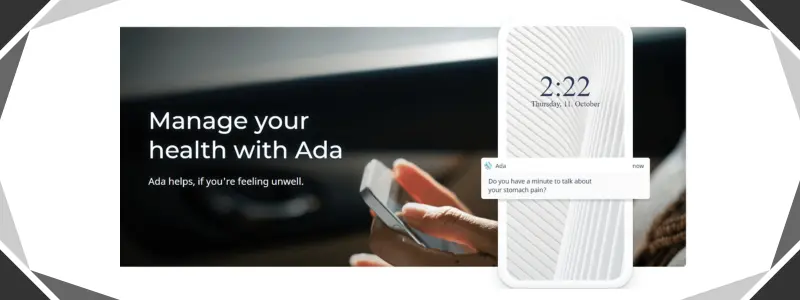
Ada is an AI-powered health companion that helps users understand their symptoms, manage their health and navigate to appropriate care. In 2025, Ada continues to offer several advanced features:
- Symptom Assessment: Users input their symptoms and Ada’s AI evaluates them against a vast medical database to suggest possible conditions. This assists users in understanding potential health issues.
- Personalized Health Information: Ada offers health information tailored to the user’s profile, enhancing understanding of their health status.
- Symptom Tracking: Users can monitor their symptoms over time, aiding in the detection of patterns and the effectiveness of treatments.
- Multi-Profile Support: Ada allows users to create multiple profiles, enabling them to manage health assessments for family members within a single app.
- Comprehensive Medical Library: Ada provides access to a medical library filled with information on various conditions and wellness tips, all based on clinical experience and the latest research.
Benefits to Healthcare
Ada offers several advantages to both individuals and healthcare providers:
- Early Detection: By identifying potential health issues early, Ada enables timely medical intervention, which is crucial for effective treatment.
- Accessibility: The app provides a convenient way for individuals, especially in remote areas, to assess their health without immediate access to a healthcare professional.
- Cost-Effective Monitoring: Regular use of the app can reduce the need for frequent in-person consultations, lowering healthcare costs.
- Data-Driven Insights: The platform collects and analyzes user data to provide actionable insights, aiding in better decision-making and personalized care.
Real-World Applications
Ada has been successfully implemented in various real-world scenarios:
- Global Reach: Ada is available in over 90 countries and has been downloaded millions of times, providing health assessments to users worldwide.
- Enterprise Solutions: Ada collaborates with healthcare providers and insurers to integrate its AI-powered symptom checker into their services, enhancing patient engagement and care delivery.
- Clinical Decision Support: Healthcare professionals use Ada’s assessments to support clinical decision-making and improve patient outcomes.
Conclusion
So guys! In this article, we covered Top 6 AI Apps in Healthcare in detail. These innovative apps are transforming how patients receive care and how medical professionals work. Personally, I recommend exploring these tools if you’re in the healthcare industry because AI is no longer the future, it’s happening now. Stay ahead of the curve and see which app fits your needs best. Don’t forget to share your thoughts or experiences with these apps in the comments!
FAQs About AI Healthcare Apps
Here is the list:
Most AI healthcare apps offer basic features for free but premium features typically require a subscription. For example, Noom offers free symptom checking but charges for personalized coaching and meal plans. Costs vary widely, from $10-50 per month for most apps.
AI symptom checkers are helpful screening tools but should never replace professional medical advice. They can accurately identify common conditions about 70-80% of the time but complex cases require human expertise. Always consult a doctor for serious symptoms or when in doubt.
Reputable AI health apps use HIPAA-compliant security measures to protect your data. However, always read privacy policies carefully before sharing sensitive information. Look for apps that encrypt data and don’t sell personal information to third parties.
Yes, most AI health apps work independently of insurance coverage. Some apps like Buoy and Ada can actually help you find affordable care options. However, if the app recommends seeing a doctor, you will still need to pay for that visit separately.
Most of these apps are designed for smartphones and tablets, requiring a camera for features like skin scanning or food logging. Some apps like Buoy also offer web-based versions you can access from a computer. A stable internet connection is typically required for AI processing.
Yes, most AI health apps are designed to complement, not replace your doctor’s care. Many apps allow you to share reports and data with your healthcare provider. Always inform your doctor about any health apps you are using to ensure coordinated care.
AI health apps include disclaimers that they don’t provide medical diagnoses or treatment recommendations. If you receive concerning results, the app will typically recommend seeing a healthcare professional. Never rely solely on AI for serious health decisions.
Many apps are designed with user-friendly interfaces but some may be challenging for less tech-savvy users. Apps like Sensely offer voice interaction and simple navigation. Consider having a family member help set up and explain the app initially.
Most AI health apps require users to be 18 or older, though some allow parental supervision for minors. Apps like Ada offer multi-profile support for families. Always check age requirements and parental consent policies before letting children use health apps.
Usage frequency depends on the app’s purpose – chronic condition management apps may need daily use while symptom checkers are used as needed. Weight management apps like Noom work best with daily logging and engagement. Consistency is key for apps focused on behavior change and monitoring.





